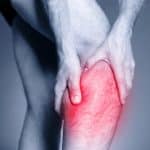Surprising Varicose Veins and Restless Legs Facts
What Causes Restless Legs?
Patients who present to my vein practice with varicose veins sometimes complain of having restless legs. Treating their large bulging veins often helps to relieve their symptoms.
A prospective study of 1,397 patients by Kanter published in Dermatologic Surgery in 1995 showed that 98% of patients reported initial relief of their symptoms after vein treatment. The recurrence rate was 8% after one year and 28% after two years.

However, that does not mean that varicose veins alone cause restless legs.
Varicose veins are only one of many conditions associated with this disorder.
More commonly, restless legs are a metabolic problem.
That means that conditions like iron deficiency, folate deficiency, magnesium deficiency, kidney disease, Parkinson’s syndrome, diabetes, neuropathy, excessive caffeine, tobacco and alcohol intake, and some medications may actually cause this problem. It is sometimes seen during pregnancy.
Restless legs symptoms vary widely. Some people have uncomfortable pins and needles, itching, or an irresistible and uncontrollable urge to move their legs.
This usually occurs at night. It can keep you from sleeping normally.
Iron deficiency can exist despite a normal blood test for iron. The tissues may not receive or be able to maintain normal amounts of iron including the brain and the cerebro-spinal fluid.
In addition, a defect or malfunction in dopamine receptors in the brain can cause you to produce more dopamine to compensate. Abnormal dopamine regulation may also be related to iron deficiency but more research needs to be done.
How Do Doctors Diagnose the Cause of Restless Legs?
When a patient presents to my office with varicose veins and restless legs, a venous Doppler is done. This is an ultrasound test on the veins of the leg. It is possible with an ultrasound Doppler exam to diagnose if blood backs up in the leg veins.
When blood travels the wrong direction (towards your feet) by gravity, you have venous reflux. That is a result of deficient or non-functioning valves within the problem veins.
A recent study in the Journal of Vascular Surgery Venous and Lymphatic Disorders by Shaydakov in April 2016 showed a higher incidence of blood clots in people with primary venous insufficiency.
Pain, ache, throbbing, heaviness, and itching often result when the varicose veins enlarge and the pressure increases within them.
Treating venous reflux is often helpful to eliminate the problem. Reports in the journal, Phlebology and Dermatologic Surgery, showed a very high success rate after treating venous insufficiency using today’s minimally invasive techniques .
Modern vein treatments include laser or radiofrequency of the saphenous veins. Often sclerotherapy or removal of the larger varicose veins through mini incisions called phlebectomy is also required.
If there is no significant venous reflux and you don’t have varicose veins, a good history by your primary care physician is essential before ordering tests.
Since caffeine, excessive alcohol, and tobacco have been associated with restless legs, these factors must be eliminated. An exercise program is an important recommendation that can be helpful.
The adjustment or possible elimination of medications known to be associated with restless legs should be left up to your doctor.
Medications that are related to the symptoms include beta-blockers, antihistamines, antidepressants and antipsychotic drugs which can make the symptoms worse.
Work-Up for Restless Leg Syndrome
After checking these risk factors, testing can be performed. Because of the conditions that are related to restless leg syndrome or RLS, the most commonly performed tests include:
- Blood urea nitrogen
- Creatinine
- Fasting blood glucose
- Magnesium
- Vitamin B-12 levels
- Thyroid stimulating hormone
- Folate
- Iron
- Ferritin levels
- Venous Doppler ultrasound
- Electromyography
Treatment of Restless Leg Syndrome
If venous insufficiency and venous reflux associated with varicose veins is present, varicose vein treatment is often curative. However, most cases of restless leg syndrome are not associated with venous disease.
In those cases, after a complete history and physical exam, the appropriate testing can be done. After a correct diagnosis is made, treatment can begin. Oodles of different medications have been used for treatment.
Medications used to treat nonvenous causes of restless leg syndrome include medications to increase dopamine in the brain like levadopa, Requip, Mirapex and Neupro. Sometimes sedatives help like benzodiazepines. Sleep medications like clonazeplon, eszopiclone, temoazepam, and zolpidem can help to relax the muscles. Calcium channel blockers like gabapentin and pregabalin are useful in some cases. Anticonvulsants like Tegretol and Lyrica, and Neurontin have been prescribed and have provided relief.
A vibrating pad device called Relaxis was FDA approved in 2014 to provide relief by counter stimulating the legs while the patient sleeps.
Conclusion
Once the correct diagnosis and cause of your restless legs have been made, the appropriate treatment can begin.
Kind of.
The only hitch is that there is a such a long list of causes for restless leg syndrome. Often the diagnosis is made by exclusion.
In many circumstances, the work up and testing is all normal!
There is good news about restless leg syndrome associated with varicose veins. There is a good chance that when the venous disease is eliminated, the restless legs usually will resolve.
Mission accomplished as a president might say.
The theory is that once the congestion from the blood in the refluxing veins has been relieved, your circulation improves. The underlying cause is eliminated.
A healthy lifestyle can often provide significant relief for those who do not suffer from venous disease. This includes exercise and avoidance of caffeine, alcohol and tobacco.
Relaxation techniques including yoga and meditation have been found to be helpful. This is especially true for patients who do not want to take medication.
Call us at 724-987-3220 if you have varicose veins and suffer from restless legs. We can discuss treatment options and design a customized plan to help provide you relief from your varicose veins and your restless legs.

